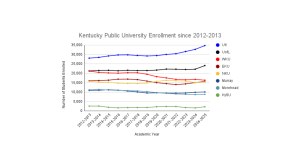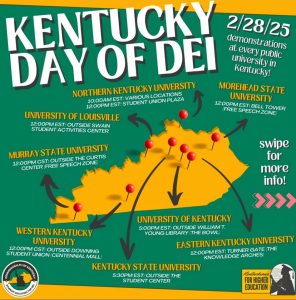Professor discusses new book
February 16, 2014
It is not often that current and former tobacco farmers and WKU students gather together for the same event.
WKU folklore professor Ann Ferrell introduced her new book, “Burley: Kentucky Tobacco in a New Century,” to the Kentucky Live! series, a program hosted by WKU’s library.
Ferrell discussed the history of burley tobacco and how farmers have viewed the way tobacco production has changed in Kentucky over the years.
“It’s about how farmers talk about those changes,” Ferrell said.
Some major changes to the tobacco industry in Kentucky include the Master’s Settlement Agreement (MSA) and the tobacco buyout.
However, these changes to federal tobacco policies only scratch the surface of the whole story, Ferrell said.
“Those are just the major public changes with tobacco,” she said.
In order to fully explain the context of these modern changes to burley tobacco in Kentucky, Ferrell gave context to how it has evolved over time.
Some of the key elements of its history that Ferrell highlighted was tobacco’s role in funding the American Revolution, and how burley tobacco had particular qualities that made it valuable in tobacco product manufacturing.
At one time Kentucky was the largest tobacco producer in the United States, however this ended in the twentieth century.
“North Carolina surpassed Kentucky in 1929 and has remained the largest tobacco producing state,” Ferrell said.
It was also during the late nineteenth and early twentieth century that the modern tobacco industry was being formed, including the introduction of Camel brand cigarettes in 1917.
According to Ferrell, the periods during World War I and World War II saw significant spikes in tobacco consumption.
“War is very central to tobacco history,” Ferrell said.
The New Deal period also led to the creation of the federal tobacco program, which instituted a quota on the amount of tobacco that could be grown on a farm, in exchange for price support from the federal government during tobacco auctions.
This program ended with the tobacco buyout in 2004, which effectively created a free market system in tobacco, Ferrell said.
“The buyout meant the end of the auction system,” she said.
The transition payments to tobacco farmers in the tobacco buyout, paid for by funds from the tobacco industry, are ending this year.
According to Ferrell, another major turning point was the MSA in the 90s. The MSA was between 46 state attorney generals and the tobacco industry. The tobacco industry reimbursed the states for tobacco’s strain on the states’ medical systems due to the health risks associated with tobacco.
The health risks associated was first majorly recognized after the US Surgeon General in 1964 publicized the connection between smoking and cancer. This change in public perception led many tobacco farmers to feel their industry was stigmatized.
“Symbolically they’ve been made to feel criminal,” Ferrell said.
With the upheavals in the tobacco industry, Kentucky has seen the percent of tobacco farmers drop from its peak in 1959 at 80 percent, to its current low of ten percent in 2007.
Some farmers have attempted to transition out of tobacco into different crops, with varying degrees of success.
“I have heard many stories about failed diversification attempts,” Ferrell said.
The culture surrounding tobacco has also changed. In the past, tobacco production in Kentucky was a family affair.
“It was hard work, but it provided a lot of good memories with the family,” Ferrell said.
Some of the changes, such as the switch to bailing tobacco, was not always welcome by tobacco farmers or others in the industry.
“There was resistance,” Ferrell said.
The so-called “Tobacco Man,” which is the romanticized view of men involved in tobacco farming, is also going out of style.
“The days of the ‘Tobacco Man’ are seen as going out, or already gone,” Ferrell said.
Even with the dramatic transition to a free market approach in tobacco, Ferrell said the tobacco industry has maintained a robust presence in Kentucky and beyond.
“Even in this riskier free market environment, tobacco continues to make sense for some farmers,” Ferrell said.
More information on the book can be found on Facebook and http://burleythebook.com.
















